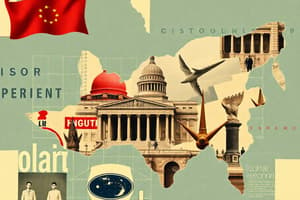Podcast
Questions and Answers
What are the key characteristics of a state?
What are the key characteristics of a state?
- Defined territory
- Permanent population
- Sovereignty
- All of the above (correct)
What is sovereignty?
What is sovereignty?
Ability of a state to govern its territory free from control of its internal affairs by other states.
What does territoriality refer to?
What does territoriality refer to?
A country's sense of property and attachment toward its territory.
What is the definition of territorial integrity?
What is the definition of territorial integrity?
What characterizes a shatterbelt region?
What characterizes a shatterbelt region?
What is a choke point?
What is a choke point?
What is neocolonialism?
What is neocolonialism?
Study Notes
Political Concepts and Definitions
- State: A political unit characterized by sovereignty, a defined territory, a permanent population, and an organized government.
- Sovereignty: The authority of a state to govern itself without external interference, crucial for maintaining independence in governance.
- Territoriality: The emotional connection and sense of ownership that individuals or groups have toward specific geographic areas, driving claims to power over those spaces.
- Territorial Integrity: The principle that a state has the right to protect its sovereign borders from external threats or interference.
Geopolitical Regions and Concepts
- Shatterbelt: Regions caught in conflict between larger powers, experiencing fragmentation due to ethnic or cultural divisions; notable examples include Eastern Europe, Korea, Vietnam, Yugoslavia, and contemporary Middle Eastern tensions.
- Choke Point: Strategic geographical locations where transit is restricted, affecting global trade and military movement; significant choke points include the Strait of Hormuz, the Strait of Malacca, and the Suez Canal, each holding considerable geopolitical importance.
- Neocolonialism: A modern form of economic dominance where multinational corporations or sovereign entities exert influence over a state without direct political control, often leading to exploitation of local resources and labor.
Studying That Suits You
Use AI to generate personalized quizzes and flashcards to suit your learning preferences.
Description
Explore key concepts in AP Human Geography Topic 4.3, focusing on political power and territoriality. This quiz features essential flashcards that define the terms 'state', 'sovereignty', and 'territoriality'. Test your understanding of how these concepts interact in the realm of geopolitics.




